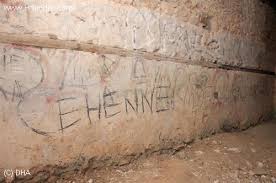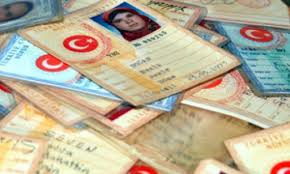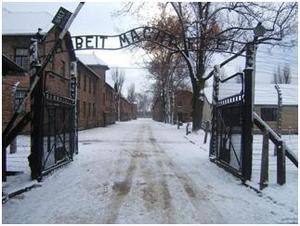
M. Ali Dogan, a Turkish journalist, went to Uruguay and learnt there that a high number of Armenians live there. It was later understood that those Armenians are the ones that could flee from the tragedy in Asia Minor.
Most of these Armenians came from Maraş, a city in southern Turkey. Reportedly, the generation that fled from Turkey still has a fresh memory of what their parents suffered. They created an association and come together under the umbrella of this association. Now, three generations live there and try to survive away from their homeland. This distance is no coincidence. As most Armenians did, they fled to the New World, which they believed to be inaccessible then. The suffering they had was so terrible and unbearable that they went to the farthest frontier possible beyond the Atlantic.
They now say that they were deprived of their neighbors and families after the tragedy, so they were sentenced to a never-ending mistrust, uneasiness and loneliness.
(Source: Aykiri Dogrular)
Monthly Archives: November 2013
Problems with Naming the Kids in Turkey
Naming the kids in Turkey with non-Turkish and non-Muslim names has always been problematic. Except for a few metropolitan cities, most prople have had problem in naming their kids the way they like until a recent history. As an excuse, they have come up with various reason, but the actual reason has been their reluctance to register non-Turkish or non-Muslim names.
A recent case from Midyat has reminded that the governmental offices are still causing problems in naming. Reportedly, a Syriac father wanted to name his infant daughter with a Syriac name, Şmuni (Shmounee), but the officer in the Civil Registry Office did not accept the name based on the reason that Turkish grammar rules do not accept two-consonant letter together. Instead, the office registered the girl with the name, İşmuni (Ishmounee), which is something different than the original one.
As per the Law passed in 2006 on Civil Registry Services, there seems to be no limitation and restriction with regard to naming . Yet, the arbitrary rejection in the Civil Registry Office has caused a significant tension in Turkey. As it is considered among the Syriac citizens that the newly fabricated name of İşmuni is not acceptable because its original version, Şmuni, belongs to a highly respected religious figure. Therefore, it is interpreted as an insult.
Holocaust Movies from France in Istanbul
“Cinema and Shoah in France” is in progress. The event organised by the French Culture Center in Istanbul is going to show five masterpieces about the crimes committed against the Jews in Vichy, France at the time of German invasion.
The main goal of the event is to show the most interesting and outstanding Holocaust movies shot by French directors. The show will take place between 11 and 13 December.
It is expected to see about 11 documentaries and fiction movies in the event. Note that discussion sessions will follow the shows. Alain Resnais, Claude Berri, François Truffaut, Joseph Losey, Louis Malle are only some of the directors whose works will be shown in the event.
Converting Hagia Sophia Church into a Mosque

On the recent days, Turkish authorities, like Bulent Arinc (the President of Turkish Parliament), have been delivering speeches that mainly point out converting Hagia Sophia Church into a mosque again. Since it was converted to a museum in the early republican period, it has not been used as a mosque. After converting the Hagia Sophias in Iznik and Trabzon, it is considered that the Hagia Sophia Church in Istanbul will be the next one. Public addresses by the ruling party’s politicians increase this probability as they always note that they long for changing it to a mosque.
To this end, the Foundation of Ottoman Dynasty has launched an online campaign and it urges internet users to share their campaign pictures to gain support. Different from the other campaigns, it gives a date: 29th of May, or the Anniversary of Constantinople’s Conquest by the Turks. The Foundation of Ottoman Dynasty wants the Church to be opened to mosque services on the anniversary day of Constantinople’s conquest by the Turks.
You Will Be Burnt in Hell!

On the day of anniversary service, held to celebrate the first anniversary of opening St George Church after 89 years, the Russian speaking church-goers were shocked to see a note painted on the church wall. A note saying that “You Will Be Burnt in Hell” was painted on a wall in St George Church in Alania, Antalya.
Anjelika Anzhela, the President of Russian Speakers Cooperation and Solidarity Society, said that the note disappointed the church-goers and it was not something that they expected to see. Anzhela reports that there is no security mechanism at the church, so anyone can come in and write or carve on the walls. She wanted the Church to be kept closed when there is no service inside.
Moreover, Anzhela says that the note was both a contempt of Christianity, and history because the building dates back to the 19th century.
Turkish President Celebrates Hannukah
![]()
Turkish President, Abdullah Gul, has released a message in the presidential website to celebrate the Jewish holiday Hannukah.
In his message, Gul notes that Jews have been living in this country for centuries in harmony and peace. Making emphasis on a long past and on the visison of a mutual future, Gul says that the Turkish society is interlocked with the Jews. The President appreciates the successful works carried out by the Jews in Turkey and says that these works will contribute significantly to the mutual construction of Turkey’s bright future.
Rescued Iraqi Jewish Heritage in Washington

Nelly Barokas, a Jew from Turkey, asks for the destinity of five-century-old Jewish documents found by the US Army in 2003 in Iraq. The documents, belonging to Baghdad Jewish community, contain religious texts and it was found in an inundated building. The documents, reportedly, are of high significance for Judaism.
The documents were rescued by a couple of experts before they were severely damaged and transferred to the US archives. The US National Archives has come to an agreement with the Iraqi Temporary Coalition Government, so the documents will be returned to Iraq after they are exhibited in the US National Archives. Now, the heritage is exhibited under the name of “Discovery and Recovery: Preserving Iraqi Jewish Heritage” in Washington.
There is an on-going debate over the return of documents back to Iraq. The US Senator Charles Schumer argues that these religious documents belonging to Iraqi Jewish community cannot belong to Iraq. Moreover, a petition campaign was launched to prevent the return of Jewish documents. More than 8 thousand petition has been signed recently.
Helga’s Diary: A Young Girl’s Account of Life in a Concentration Camp
The remarkable diary of a young girl who survived the Holocaust—appearing in English for the first time.
In 1939, Helga Weiss was a young Jewish schoolgirl in Prague. Along with some 45,000 Jews living in the city, Helga’s family endured the first wave of the Nazi invasion: her father was denied work; she was forbidden from attending regular school. As Helga witnessed the increasing Nazi brutality, she began documenting her experiences in a diary.
In 1941, Helga and her parents were sent to the concentration camp of Terezín. There, Helga continued to write with astonishing insight about her daily life: the squalid living quarters, the cruel rationing of food, and the executions—as well as the moments of joy and hope that persisted in even the worst conditions.
In 1944, Helga and her family were sent to Auschwitz. Before she left, Helga’s uncle, who worked in the Terezín records department, hid her diary and drawings in a brick wall. Miraculously, he was able to reclaim them for her after the war.
Of the 15,000 children brought to Terezín and later deported to Auschwitz, only 100 survived. Helga was one of them. Reconstructed from her original notebooks, the diary is presented here in its entirety. With an introduction by Francine Prose, a revealing interview between translator Neil Bermel and Helga, and the artwork Helga made during her time at Terezín, Helga’s Diary stands as a vivid and utterly unique historical document.

Dual Citizenship to Turks in Germany

The German Chancellor Angela Merkel and Social Democrat Sigmar Gabriel have come to an agreement to make a post-election coalition. As a part of this coalition, an item was discussed as a requisite.
As a result, the Turks in Germany will have the chance to hold dual citizenship, which was previously abolished. With this amendment, the citizens with dual citizenship were supposed to choose either of their citizenship by law. From now on, Turkish citizens with German citizenship will not be forced any longer to make a choice at the age of 23 for citizenship status.
Non-Turkish Names in School Practice Books

A share in social media has revealed an interesting use in elementary school books. According to a medical doctor’s private note, the practice books used in a private school (in Bakirkoy, Istanbul) contain some names that are not purely Turkish and Islamic. The picture shows that several names, like Daniel, Helen, are used in the questions.
One may think that the school might be a minority school, but it is not. And the practice book is used for the Level 4 in elementary schools.
The use of non-Turkish and non-Islamic names in course books is important in that it was a problem several years ago when the Turkish authorities prepared course books for the minority schools that contained only Turkish and Islamic names, which was naturally not welcomed by the school authorities. This example represents a positive development to show the possibility of co-existence in spite of differences and the existence of a multi-cultural society.
In a sense, it makes Hrant Dink’s expectations come true, as he once noted that he would like to see basic sentences in elementary schools include the names of kids from different ethnic and religious groups.

